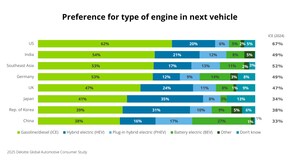Deloitte Survey: Only Seven Percent of Companies are Well Prepared to Comply with New Lease Accounting Standards
Companies with Large Lease Portfolios Anticipate Significant Upgrades or Acquisitions of New Technology Systems Necessary to Comply with the New Standards
NEW YORK, Feb. 16, 2011 /PRNewswire/ -- Just 7 percent of executives believe their companies are extremely or very prepared to comply with new lease accounting standards proposed by the Financial Accounting Standards Board (FASB), according to a recent Deloitte survey.
As early as June 2011, the new proposed draft standards distributed in August 2010 may be finalized. To comply, lessees (and possibly lessors) would have to fundamentally change how they account for real estate and equipment leasing transactions, providing more extensive financial statement disclosures than ever before. The new standard would effectively eliminate all operating leases and require them to be capitalized on the company's balance sheet. For lessees, it would also replace rent payment expense reporting with interest and amortization expense reporting.
"These changes will have an immense impact on many companies that lease commercial property," said Josh Leonard, a leader in Deloitte's real estate consulting practice. "Beyond the major changes involved, companies need to start looking at their lease portfolios now for adequate lease information, technology capabilities, and resources to implement and monitor the new standard, expected to be final by mid-year 2011."
From a financial perspective, more than 80 percent of respondents believe that the lease accounting standards will place a significant burden on financial reporting for tenants as well as property owners. More than 40 percent of respondents believe the new standards would make it more difficult to obtain financing. In addition, 68 percent of respondents said it would have a material impact on their debt to equity ratio; and, roughly 40 percent thought the new lease standard would lead to shorter term leases.
Only 35 percent of respondents are extremely or very confident in the integrity of their company's lease data needed to comply with the new standard. Further, to accommodate the new standard, major IT investments would likely be needed. One-quarter of respondents said their companies are likely to have to make a major upgrade to their information technology systems, while 20 percent said they are likely to acquire a new system. Among companies with 1,000 or more leases, the need for IT investment was even greater — 39 percent of these respondents expect the new standards will lead to a major technology system upgrade, while 27 percent expect to acquire a new system. In addition, just 21 percent of respondents are extremely or very confident in the capability of their companies' information technology provider to comply.
Half the respondents at companies with 1,000 leases or more expect that implementation would take one year or longer.
"For the real estate industry, the impact of the proposed new lease accounting changes will impact both the balance sheet and tenant strategy and execution. For owners and operators, the big shift will be in what their tenants demand. Shorter term leases may be in high demand along with an increased tenant appetite to forego renting in favor of buying," said Bob O'Brien, vice chairman and real estate services leader for Deloitte LLP. "In addition to changing how they do business, real estate companies are going to have to make changes in how they operate. The proposed new leasing standards will require a re-examination of capital expenditures on new leases, enhanced lease administration and forecasting systems, and careful consideration of the balance sheet and income statement impacts on existing loan covenants. The changes may be sweeping."
About the survey
The survey was conducted online from Dec. 1, 2010 to Jan. 3, 2011, and was completed by 284 respondents who received a Deloitte invitation to participate. The survey was conducted by Bayer Consulting.
Certain questions were only asked of the following types of respondents: lessees, lessors and real estate service providers. Note: 24 respondents were from companies that are both service providers and also lessors. Respondents came from companies that manage a range of different sized lease portfolios: less than 100 leases (29 percent); 100 – 999 leases (34 percent); and 1,000 or more leases (32 percent). Respondents represent a variety of industries including real estate (33 percent), retail (20 percent), and financial services (10 percent).
As used in this document, Deloitte means Deloitte LLP and its subsidiaries. Please see www.deloitte.com/us/about for a detailed description of the legal structure of Deloitte LLP and its subsidiaries.
Shelley Pfaendler |
Liz Cheek |
|||
Public Relations Deloitte |
Hill & Knowlton +1 212 885 0682 |
|||
+1 212 492 4484 |
||||
SOURCE Deloitte
WANT YOUR COMPANY'S NEWS FEATURED ON PRNEWSWIRE.COM?
Newsrooms &
Influencers
Digital Media
Outlets
Journalists
Opted In






Share this article